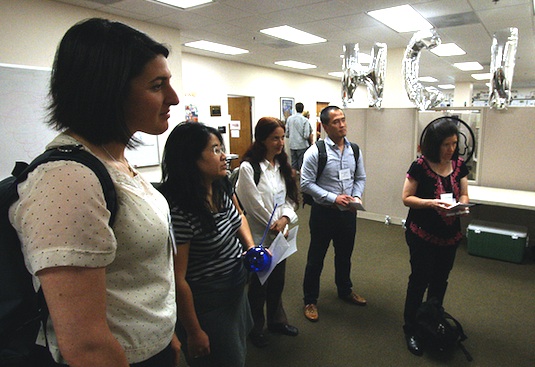

Photo: Brian Keegan
GRAND was a proud sponsor of the 2013 Digital Societies and Social Technologies Summer Institute at the University of Maryland, College Park (July 28-August 1, 2013). Jointly organized by the Consortium for Science of Sociotechnical Systems (CSST) and the Summer Social Webshop, the event brings together a community of researchers from academia and industry focused on the problems and opportunities arising from the interplay of social and technological systems which span individuals, groups, organizations, and societies. This year, GRAND organized a delegation of three doctoral students to attend the event: Naureen Nazam (Dalhousie), Claude Fortin (SFU) and Farjana Eishita (Saskatchewan). The following is part of a three-part blog series about their experience.
By Farjana Eishita
Digital Societies and Social Technologies (DSST) 2013 was an opportunity for me to collaborate, work and network with peers of similar research area. DSST was mostly about socio-technical research area and my research focuses on qualitative analysis on Augmented Reality (AR) smartphone games. A significant amount of my research work focuses on collaboration and user study analysis perspective. Therefore there was an effective bridge between DSST and my research that is going to leave a positive impact on my research career.
At the very first ice-break dinner, there was a discussion regarding all the sponsors and I got the opportunity to explain GRAND and it’s work in front of the community proudly. All the sessions arranged were very much informative and helpful. The group works assigned after each session helped developing the skill of application of the theory discussed. Moreover, since the tasks were assigned in a group, it opened an opportunity collaborate with peers from the same area. Deeper discussion helped nourishing my current research technique. Specially the sessions on User study perspective helped directly in my research.
Most importantly, the spotlight sessions were the one that was magnificently helpful for me to improve my research area. In my spotlight group, I had the opportunity to have Michelle Carter from University of Nebraska-Omaha and Dawn Nufus from Intel. Through these people I had the perspective of research as well as industrial area on my research. That was an excellent thing as I am mostly focusing on the impact of spatio-temporal variable resolution of AR games upon the players during gameplay to help the game developers in the current industry.
I express my humble gratitude to GRAND for selecting me and sending to such a broader network of communication.